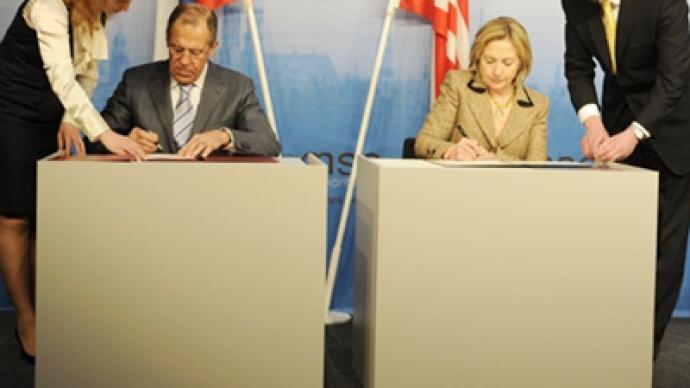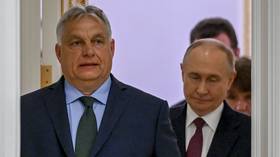Russia and US get STARTed

The new Strategic Arms Reduction Treaty between Russia and the US has fully come into force after Russia’s Foreign Minister and the US Secretary of State exchanged ratified and signed documents.
Following the ceremony, Russian Foreign Minister Sergey Lavrov announced that the New START treaty has taken effect in the form it was signed by the presidents of the two countries.Even though the two sides had made so-called "special statements" or recommendations, they will not affect the actual implementation of the deal. The original text remains untouched."Russia and the US eventually manifested their responsibility for security in the world and their readiness to continue moving towards stability," Sergey Lavrov said. “We have many plans and we will try to implement all of them." “I would like to underline that the START treaty [is in] the national interests of both the Russian and American people,” he added. “It favors nuclear non-proliferation and disarmament.”Hillary Clinton said that in the course of 45 days, Russia and the United States are due to exchange complete information about their nuclear arsenals. She added that within 60 days the sides are due to resume mutual inspections. Clinton observed that the countries have managed to attain visible progress in the “reset” process. “Two years ago we all laughed about the translation of the ceremonial ‘reset’ button that I gave to the foreign minister in Geneva, but when it came to the translation that mattered most, our two countries, led by our two presidents, turned words into action to reach a milestone in our strategic partnership,” she said.Sergey Lavrov and Hillary Clinton met on the sidelines of the international 47th Munich Security Conference which they were both attending. The documents they exchanged were earlier ratified by the parliaments of both countries after heated debate. The US Senate backed the treaty in December 2010. Before ratification, American legislators amended the treaty, securing Washington’s right to modernize its remaining nuclear arsenal. Another statement stipulated that the treaty should not obstruct US defense plans in Europe.Before giving their approval to the START treaty, the Russian State Duma also made several amendments to the document. One of them suggests that Moscow can back out of the treaty if it feels that US missile defense plans in Europe pose a threat to Russia’s national security.The new treaty will obligate the two countries to cut their atomic arsenals by a third and will regulate military-nuclear relations between Russia and the US for the next ten years, with a possible five year extension option. It was originally signed by presidents Dmitry Medvedev and Barack Obama on April 8, 2010 in Prague.Nuclear disarmament campaigner Kate Hudson said that the New START treaty is a very important factor in the global trend away from nuclear weapons. “The fact that the two biggest nuclear powers are engaged in a disarmament process must surely encourage other countries not to go down that route themselves, not to go down the nuclear proliferation routes,” she said.“I think as an indication of the way the international community is moving on nuclear weapons, this is very significant indeed and of course, the way is open for the United States and Russia to pursue further bilateral reductions,” Hudson added.
Kommersant newspaper political analyst Sergey Strokan believes that the New START is sending a powerful message to the world community. “When we discuss the importance of the START treaty, we have to understand that it is not only the deepest cuts of nuclear weapons in world history,” he said. ”The treaty is definitely an important political and psychological message, a message to the world powers that nuclear weapons are obsolete, they do not fit into the defense strategies of the world powers. They have to cut them.”Strokan added that getting rid of nuclear weapons will make the US and Russia stronger. “Definitely, it will make them stronger because it envisages not only cuts of nuclear weapons but also both sides would have to undergo modernizing of their potential,” he said. “That is why their military force will be more up-to-date.”
Professor of politics at the University of Kent, Adrian Pabst, told RT that the new treaty is a practical step toward genuine “reset” between Russia and the United States. “It is a confidence-building measure. The ‘reset’ has often been dismissed as just nice rhetoric with little action, but now we have a concrete outcome of the reset in US-Russia relations and I think that both sides want to build on this,” he said.
Yury Rogulev from the Franklin Roosevelt Foundation of US Studies said that hopes are high that other countries will follow the example of the United States and Russia. “The importance of this agreement is the example to the other countries,” he said. “First of all, to those countries that do have nuclear armaments and to those countries who do not agree to join the non-proliferation movement. This agreement between the United States and Russia, I think, would promote the non-proliferation process and would help to include other countries to the process of arms reduction.”













